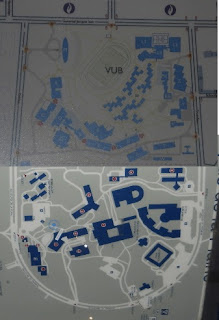 |
| Moule-Frites, one last time |
Well Brussels probably will be. It's Belgium I worry about. Belgium is very unstable. If you follow their politics (okay silly me - why would anyone follow Belgian politics?) you know that they are having an impossible time forming a national government. The election was six months ago and still the parties cannot agree who should govern. This is not new for Belgium. Unfortunately their last election had the same outcome and when after almost a year they did form a government it only held together for short while before collapsing and leading to the present sad state of affairs.
 |
| Mr P as a Walloon Revolutionary |
So what's wrong with them? Belgium has an interesting and surprisingly short history. Brussels may be ancient, but 200 years ago there was no such thing as Belgium. This territory was a battleground literally (Waterloo 1815) and metaphorically. It passed back and forth between the European powers. Ruled by whoever’s star was ascendant at the moment. Though the ‘powers that be’ shifted, the people were, who they were. The Dutch-speaking Flemish in the north and the French-speaking Walloons in the south. They did not have much in common, but it did not matter much. They were both just provinces, ruled by outsiders. They went about their business, ignoring each other.
Until 1830, when the French Walloons had had enough. They were ruled by the Dutch (from Amsterdam) at the time. Wrong language, wrong religion - they revolted. The Catholic Flemish came along for the ride. What they had in common – religion - was more important than the differences. For a while.
 |
| la Fete de la Communauté Francaise |
A profound split has been developing between the communities. They share almost nothing. Early in our stay here, at the French University we took a day off to celebrate ‘la Fete de la Communauté Francaise’. There was a concert on the Grande Place and a parade of reenactors in period dress, celebrating the Revolt against the Dutch. It is not celebrated in Flanders. They have different holidays.
 |
| the French map |
 |
| the Dutch map |
The odd thing is that the Dutch paper does not list the French channels and vice versa. They both list the foreign language channels (BBC, CNN, ZDF) but not the Belgian channels that broadcast in the ‘other language’. It's like they don't exist. So, to get the whole list you have to pick up both papers. When you do, if you read them, you start to notice other differences. The same firm publishes them both, but they do not have the same stories. The international, and sports news is all the same, but the local news, especially the political news, is often completely different.
Canadians will recognize the dynamic. They live in two solitudes. Side-by-side with very little interaction. You see it in the university systems as well. As a matter of fact I'm benefiting from it. At the French university they only allow me to take 14 ECTS (credits), which would not have been enough to justify a
 |
| You could combine them... |
No comments:
Post a Comment